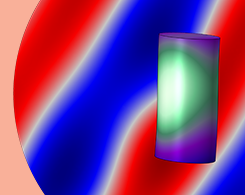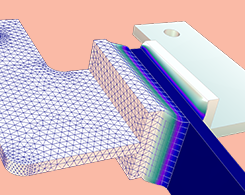Blog Posts Tagged Technical Content

Introduction to Modeling Acoustic-Structure Interactions in COMSOL®
To model an ASI problem, you need to account for the behavior of elastic waves in solids, pressure waves in fluids, and their interaction. The COMSOL® software includes interfaces for doing so.

Frequency Response of Mechanical Systems
Read this blog post for a detailed look at damped mechanical systems, a guide to setting up frequency-response analyses in COMSOL®, and a discussion of how to interpret your results.

Efficient Parameter Control and Usage in COMSOL Multiphysics®
Any model can benefit from a proper parameter list. Learn how to control and use model parameters more efficiently with features such as parameter nodes and forms.

How to Use Lumped Elements to Model a Mechanical System
Modeling a large, complex system? You may want to simplify configurations in the model setup to better understand it, but how? Enter the Lumped Mechanical System interface in COMSOL Multiphysics.

Electrode Balancing of a Lithium-Ion Battery with COMSOL®
Electrode balancing is an important consideration for battery cell engineers. Get an overview and mathematical framework of this phenomenon and learn how to analyze it in a lithium-ion battery.

How to Use Circular Ports in the RF Module
Degeneracy in circular ports leads to uncertainty in the mode field orientation. Not so with the Circular Port Reference Axis feature, which lets you define field orientations on port boundaries.

Heat Transfer with Radiation in Participating Media and the Discrete Ordinates Method
Here’s your complete guide to the discrete ordinates method, quadrature sets, and how to model the interaction between radiation and a participating or absorbing medium.

Introduction to Numerical Integration and Gauss Points
In this comprehensive blog post, we go over the theory behind numerical integration, Gaussian quadrature, Gauss points, weak contributions, and much more.
